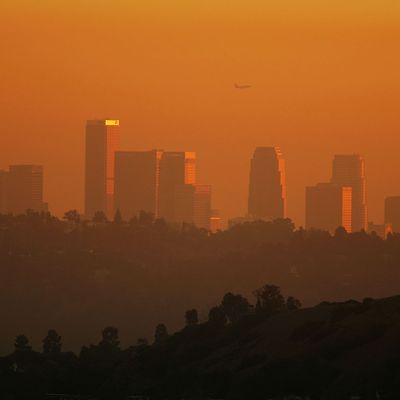
In an expansion of its war of words and lawsuits with the state of California over immigration policy, the Trump administration is issuing a dual threat to the Golden State’s right to police its own environment. One prong of this attack involves a lawsuit to invalidate a novel California law that seeks to give the state the right of first refusal for the sale of federal lands within its borders. The second renews an effort by the George W. Bush administration to revoke a long-standing waiver California has held to offer tougher Clean Air Act standards than the federal government, which has led it to adopt fuel-economy standards adopted by 12 other states (and emulated internationally).
The attempted land sale “veto,” which expands state authority over federal property to an unprecedented extent, would appear to offer the administration the best odds of a reasonably quick victory in the courts. But California’s Democratic politicians and environmental activists will ensure that Team Trump takes a beating in the court of public opinion for its eagerness to sell off public lands (roughly half the state of California) for private development.
The auto-emissions fight, however, is an old one, dating back to the days before the Environmental Protection Agency was founded and the Clean Air Act as we know it today was developed, when California, famously beset by smog, was a pioneer in environmental regulation. The 1970 Clean Air Act amendments authorized waivers allowing California (and states choosing to adopt California’s standards) to exceed federal standards for air quality, including those governing automobile emissions. Subsequent administrations continued to reissue waivers, and California (usually supported by the auto industry itself) set the pace for the country and much of the world, until the Bush administration balked at a 2002 California law imposing significantly higher fuel-economy standards than it supported nationally. After formally denying renewal of the Clean Air Act waiver in 2007, the feds were tangled up in regulatory and legal actions until Barack Obama took office and called off the dogs.
What distinguishes the Trump effort from its predecessor is that the Bush administration was supporting its own less ambitious initiative to strengthen fuel-economy standards for autos. Team Trump, led by Mr. Fossil Fuel himself, EPA administrator Scott Pruitt, is trying to lower federal standards significantly. And its clientele in this revanchist effort includes oil companies fearing clean-energy cars and also an auto industry that now sees an opportunity to batten on low oil prices and the consequent consumer lust for gas-guzzling trucks and SUVs.
The fight to bring back dirtier cars won’t be easy, though, as the New York Times reports:
Even at the federal level, the president’s announcement alone will not be enough to immediately roll back emissions standards, a process expected to take more than a year of legal and regulatory reviews by the E.P.A. and the Transportation Department. The Trump administration would then need to propose its own replacement fuel-economy standards.
And then the administration would face the same tough fight in the courts that eventually thwarted Bush, and with fewer possible grounds for compromise, as the Los Angeles Times notes:
Pruitt’s legal ability to revoke California’s authority is uncertain and any such move could be tied up in court for years. In the meantime, auto companies would be faced with the complicated and costly prospect of building and selling two different sets of cars — one for California and the other states that follow its standards, and one for the rest of the country.
The resisting states account for more than a third of all car sales. Although automakers have been hopeful some deal could be brokered, perhaps with California agreeing to weaken the more immediate targets in exchange for federal buy-in to more aggressive goals through 2030, that is looking increasingly unlikely.
Pruitt says he’s not interested in making such concessions, and California officials say they see no reason to go along with his rollback.
Indeed, Pruitt’s not sounding the least bit conciliatory:
[Pruitt] signaled that he aimed to make California fall in line. The Obama administration, he said, “made assumptions about the standards that didn’t comport with reality, and set the standards too high.” California’s history of setting its own emissions rules “doesn’t mean that one state can dictate standards for the rest of the country,” Mr. Pruitt said.
California’s strategy undoubtedly relies on the hope that the clock will run out on the Trump administration’s drive to preempt tougher fuel-economy standards because Trump himself will be evicted from office in 2020. Between now and then, however, the rhetoric will be as hot as a climate-change-driven summer day in Southern California. Governor Jerry Brown, who was attorney general of the state when it successfully fought off the Bush administration’s assault on higher fuel-efficiency standards, is accepting the call to battle:
California Governor Jerry Brown said Monday the EPA’s decision represents a “cynical and meretricious abuse of power [that] will poison our air and jeopardize the health of all Americans.”
If the president and his people think it will help them with their “base” to pick fights with California and its alleged secular/socialist/hippie character, they’ll get their money’s worth.






























